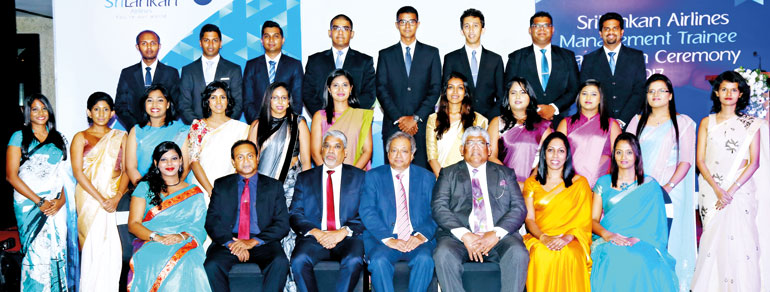Sunday Feb 22, 2026
Sunday Feb 22, 2026
Tuesday, 11 July 2017 00:01 - - {{hitsCtrl.values.hits}}

SriLankan Airlines Chairman Ajith Dias and Chief Executive Officer Capt. Suren Ratwatte along with senior members of Human Resources of SriLankan with the management trainees
Creating opportunities for dynamic young individuals to achieve their potential, SriLankan Airlines recruited 20 new management trainees, following a one-year comprehensive training program.
The Management Trainee Program was implemented with the intention of absorbing new blood into the organisation. It is vital that key positions are filled by newcomers who will not only benefit the organisation by preventing inbreeding of ideas but will also grow with the organisation to take up future managerial positions.
SriLankan Airlines has taken six management trainee batches in the past and the current intake was inducted in June 2016. The Management Trainee Program has been in effect from 2000 and many of those who joined the organisation as a result of this endeavour have continued to grow with the company.
SriLankan Airlines Chairman Ajith Dias stated: “Launching a career is a very big step and we are indeed pleased to welcome the new management trainees. The airline is going through a decisive period and we hope that they will play a positive part in supporting all our future ventures. A key feature of the entire training program is the fact that we have been able to maintain full transparency throughout the entire process, which was unbiased and fully compliant to create the environment of trust and fair appraisal.”
The selection process was comprised of a number of rigorous procedures in order to ensure that only the best out of potential candidates were selected. Following responses to press advertisements, the company shortlisted applications of those with degrees with a class or equivalent full professional qualification or outstanding collegiate career with three credits for A/Ls, who have excelled in sports at a national level while belonging to the required age category. From 2,391 applicants, 1,505 were shortlisted and called for a written test.
A total of 20 candidates were officially selected for training after being selected through a multi-stage recruitment process that included shortlisting sessions, an assessment centre, and interviews with the senior management team and the board.
SriLankan Airlines Director Colonel Sunil Peiris, the driving force of 2016 Management Trainee Batch said; “The Management Trainee Program is something that most of the top organisations in the world have adopted in order to ensure that new blood is infused into the company. By doing so, we hope to prevent inbreeding in the organisation, generate fresh ideas and fill in the void left by the retirement of veteran managers.”
The training period lasted for one year, comprising of two stages. The first stage consisted of classroom training which furnished the trainees with in-depth knowledge on the aviation industry which included an IATA examination and Harvard Manage Mentor Certification. The second stage consisted of cross functional training, and the trainees were divided into groups of four, each mentored by a member of the Senior Management Team. A Special Leadership Skills Development program was part of the overall training process through a series of workshop sessions, business simulations and business forums, each of which was aimed at developing the essential soft skills and keen understanding of real business situations that are essential tools in management and leadership. Several proposed training topics were undertaken by third parties such as the Employers’ Federation of Ceylon and the British Council.
Head of Human Resources Pradeepa Kekulawala further affirmed that the program is essential for the future development of the company. “Our Management Trainee Program is designed to create and develop leaders. The trainees were given direct, hands on experience from the start, and encouraged to develop and implement new ideas that challenge the norm and drive continued improvement.”